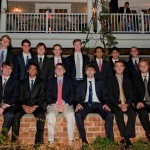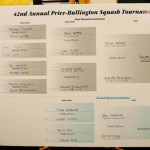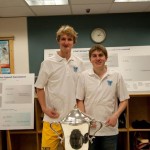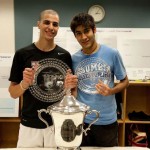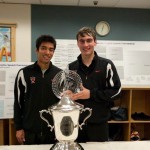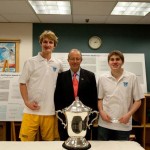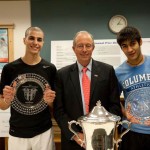Guest writer Ted Price is the tournament director of the annual Price-Bullington Invitational Squash Tournament, which was held November 3rd – 4th. Photographs courtesy of Mary C.H. Johnson.
Richmond, VA — The 42nd Price-Bullington Invitational Squash Tournament was a dream matchup in almost every sense. The tournament featured ten All Americans, five college team captains, at least five of the top nine CSA ranked players, a mostly unknown but potentially very strong youngster from Bates College, and overall was probably the strongest field of the past 20 years. Played at the Country Club of Virginia as it has been for the past 20 years, the field was led by Ali Farag, undefeated (2011-2012) Harvard junior and winner of the 2012 Nationals, and Ramit Tandon, the phenomenal Columbia sophomore, runner up in the Nationals in 2012, the #1 and #2 players, respectively, in the CSA. Farag and Tandon had been the respective champion and finalist of the 2011 P-BI and were generally expected to be in the finals again in 2012. Following this powerful duo were Todd Harrity, Princeton senior and the #3 CSA player, Andres Duany, Rochester senior and the #6 CSA player, Gui de Melo (F&M ’15), Ahmed Khalek (Bates ’16), Brandon McLaughlin (Harvard ’15), Tyler Osborne (Princeton “15), Johan Detter (Trinity ’13), Samuel Kang (Princeton ’15), Richard Dodd (Yale ’13), Gary Power (Harvard ’14), Reinhold Hergeth (Trinity ’13), Adam Perkiomaki (Rochester ’13), Dylan Ward (Princeton ’14), and Stephen O’Dwyer, the winner of the P-BI Qualifier.
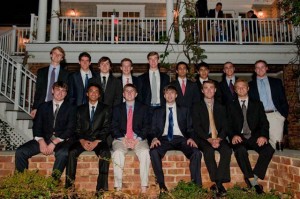
As the tournament got underway, anticipation was high and speculation rampant. Would the Bates freshman, Ahmed Khalek, live up to his potential of having not lost a match in the past two years and having won the 2012 U19s without losing a game, or would he succumb to jitters on playing his first collegiate match? Would the amazing young Egyptian, Ali Farag, dominate all, or would Ramit Tandon, the extraordinarily talented sophomore from India rise to the challenge and take the crown?
As it turned out, there were no upsets and nearly all matches were won in three games in the first round matches: Farag easily defeated O’Dwyer in 3, Osborne did the same with Detter in 3. Khalek, in his first collegiate match, dispatched Power in 3, while Duany ran through Ward in 3 and Harrity defeated Hergeth in 3. Gui de Melo changed the beat of things and was forced to five long games to overcome Dodd while Kang overcame McLaughlin in a long 4. Second seed Tandon had little difficulty and blew through Perkiomaki in 3.
The second round was more interesting from a spectator’s point of view as the players settled down to more difficult tasks. Farag, facing a revved up Tyler Osborne, won his first game relatively easily, testing the Princeton sophomore with deceptively simply drops, 11-8. In the second game, Osborne, apparently more accustomed to Ali’s deceptions, drove hard and well only to lose again, 13-11. Squash is nothing if not a contest of legs and lungs, and Osborne was to use all of both in the third game, attacking the whole time to win 11-6 – but in the process running out of fuel and succumbing to Farag in the fourth 11-9. At the other end of the draw, Tandon found the going somewhat easier again Kang of Princeton, although the Indian started cautiously, testing an ankle that had been severely turned early in the week. Tandon has an ability to glide around the court, seeming effortlessly, looking for opportunities, and despite ankle worries, he controlled the play. Wherever Kang put the ball, Ramit was there first, generally before the ball arrived, so good was his anticipation. The Columbia junior closed out the match quickly 11-8, 11-7, 11-6.
In the middle of the draw, third seed and fourth seeds Harrity and Duany, respectively, had very different matches. Duany, the #6 player in the CSA, came up against the relatively unknown Khalek and found the going difficult. Khalek, blooded by his first college match, was far more confident than he had been in the opening points of his previous match. His power and versatility were hard to miss as he slammed the door on Duany in the first game 11-1. The youngster was all over the court, moving with the same grace and apparent lack of effort as his countryman Farag did. Khalek seemed to hit with more intensity than Farag, however, and Duany seemed like a deer in the headlights. Nevertheless, the Rochester player gathered his wits about him in the second game and put Khalek on his heels for a change, keeping the Bates freshman behind him with deep rails and deft roll corners to take the game 11-3. This game loss seemed to inspire the young Egyptian however, and he brought his “A” game skills to the next two games grinding out a long third 11-7 and then, with Duany gasping for breath, closed out the fourth 11-2. Third seeded Harrity had a far simpler outcome against his opponent de Melo. The #1 Princeton player moved with ease, attacking from the first point and pounded out a fast 11-7, 11-4, 11-2 victory.
The semi finals on Sunday were eagerly anticipated by spectators as the ultimate in squash enjoyment. At the top of the draw top seeded and #1 CSA player Ali Farag would take on his fast rising countryman Ahmed Khalek while at the bottom of the draw Columbia’s star, Ramit Tandon, would face Todd Harrity, who two years ago as a sophomore had been undefeated in college play, losing only two games on the way to the national title.
The start of the Tandon/Harrity match was much as expected. Tandon was quickly ahead 4-1 in spite of Harrity’s aggressive retrievals. Harrity came back with two winners, one a deep back hand drive that Tandon could not dig out of the corner and the second a Harrity drop that Tandon tinned. These would be the last points that Harrity would win in the first game as Tandon took control. The Columbia sophomore’s ability to hold the ball was impressive, several times leaving Harrity moving the wrong way as Tandon wristed the balled away from him. Additionally, the ability of Tandon to move like lightening up and down the court , almost floating, was marvelous to watch.
The second game began much as the first one although it appeared as if Harrity was less tentative and more confident of his shots. Shots were traded fairly evenly throughout the game although one had to be impressed again with the deftness and lightness of Tandon’s touch. Rallies in the second game were long – no sign of any ankle weakness for Tandon – and both players were effective at putting the other on defense. At 8-5 for Tandon, Harrity strung together a roll corner for one point and a long and deep rail rally for another to bring the score to 8-7. Tandon, showing no effect of the length of the points, then quickly ended the match with three perfect shots, a volley roll corner, a drop from the back court that caught Harrity back peddling and the last a perfect rail drop. Two games for Columbia.
The third game was a nail biter for the spectators and the players. Harrity knew it was time to fish or cut bait and he came out looking for a great white. Every point was long. Harrity’s approach was to hit the ball hard, driving rails too close to scrape off the wall and that landed perfectly. These shots allowed Harrity to set up his drops while Tandon fought back with lobs and wrist flick drops. Harrity had the game won at 10-7, but allowed Tandon to bring the score back to 10 all. On the next point Tandon tinned a drop: 11-10. Ramit came back with a gorgeous hold and a reverse corner. 11 all. Tired of all this, Harrity put the pedal down and won the next point on a drop off a wild reverse corner and the final point on a Tandon volley tin.
The fourth game opened with the same intensity that the third ended on but this was unsustainable. Harrity was tired but fighting. The rallies were long and points traded fairly evenly. With Harrity up 6-3, Tandon looked as if he had just walked on the court, while Harrity was drooping. The end was quick with Tandon simply outplaying the tired Tiger, 11-6.
The action now moved to the top of the draw with Ali Farag taking on Ahmed Khalek. The younger player, after his quarter final win over Duany, had gained great confidence and was ready. Farag did not seem very concerned either way and bounded around the court during the warm ups looking like a young deer. It was somewhat surprising to spectators when the 1st game was fairly even throughout. Both players would gain leads and then lose them. Farag seemed relaxed, smiling as he bounded around the court. Always gentlemen on court, both players called double bounces on themselves when no one could make out whether a shot was up or down. It did seem, in the first game, that Ahmed was more in control of the ball than Ali was, as the younger player won the game 11-9.
The fact that an unseeded player was now one up in the semi final to the #1 seed was lost on no one as they waited for the second game to commence. Ahmed left no doubt that he was planning on an upset as he started off the second game in a blur of activity. It seemed he could make no mistake as he drove to a 6-1 lead. Ali again called a double bounce on himself and missed several fairly easy overhead backhand volleys. Despite being somewhat behind on points, there was no apparent concern in Farag’s demeanor. The smile remained in place and his easy grace continued. However, there was just a bit more dedication in his shots, a little more pace and control as the older player took stock of things at this point, apparently realizing that he had to do something to bring order back to his side. After allowing Ahmed one more point, Farag put on a show that garnered 6 fast points using his ability to hold the ball for the most extraordinary length of time for most of them. 8-7 for Ali. From here the two players traded shots to bring the score to 11 all. Something happened at this point as Ahmed either lost his concentration or reality kicked in – or something, but the younger player suddenly went flat. Khalek lost the next point on an out of court lob and then the game, when Farag held a wild shot of Khalek’s, backing the Bates player out of the way and then lacing a cross court for the win.
The third game was a repeat of the latter part of the second. Khalek could not regain his composure while Farag controlled the court. Khalek won the first point on a very long rally that ended with Farag tinning a cross court. At the end of the point it appeared Khalek was a little winded but nothing prepared the spectators for what came next. It was “deer in the headlight time” as time and again Khalek hit shots into the tin, missed lobs and generally could not regain his focus and control. Mercifully the game was over quickly, 11-1.
The final game was nearly as painful for the Bates freshman. Farag won the first point, then Khalek took the next three before Farag turned on the heat. Again Khalek, although trying valiantly, was unable to respond to the top seed’s onslaught and the game and match went to Ali Farag in four: (9-11), 13-11, 11-1, 11-3.
After these two wonderful semis, the spectators were really looking forward to the same finalists contending for the title as had met in 2011. Sadly, this final was not to be. Just before the match was to start Tandon came to the officials and revealed a badly wounded foot. He had lost a toe nail and it was a devastating wound to look at. Great sportsman that he is, he asked that we tape up the toe so he could compete. Tournament officials tried to dissuade Tandon but finally conceded to his wishes. The first game really was not a competition but more an easy hitting contest to see who could be nicer to the other. Farag put no balls in the front court in the game to try to save Tandon from stopping short and Tandon did not try to take advantage of this situation although he could hardly move. Game to Farag 11-3. The second game had hardly begun when Ramit admitted that he could not continue. Match and P-BI crown to Ali Farag for the second year in a row.
As is usually the case, the consolation finals were almost as good as the main draw would have been. In the First Round consolation Trinity’s captain, Johan Detter, who having beaten O’Dwyer and Power to gain the final, drove hard to defeat a wired Brandon McLaughlin of Harvard who in turn had bested Perkiomaki and Dodd to reach the final. Detter’s hopes and efforts were dashed when the Harvard junior won 11-4, 11-7, (5-11), 11-3.
In the Second Round consolation it was an all Princeton final, played the week following the Tournament (the players had to catch trains back to Trenton). Tyler Osborne, who beat Duany to reach the final, bested teammate Samuel Kang, who had defeated de Melo to make the final, in a marathon match: 11-8, 11-8, (9-11) 11-8.
Spectators were not disappointed.


